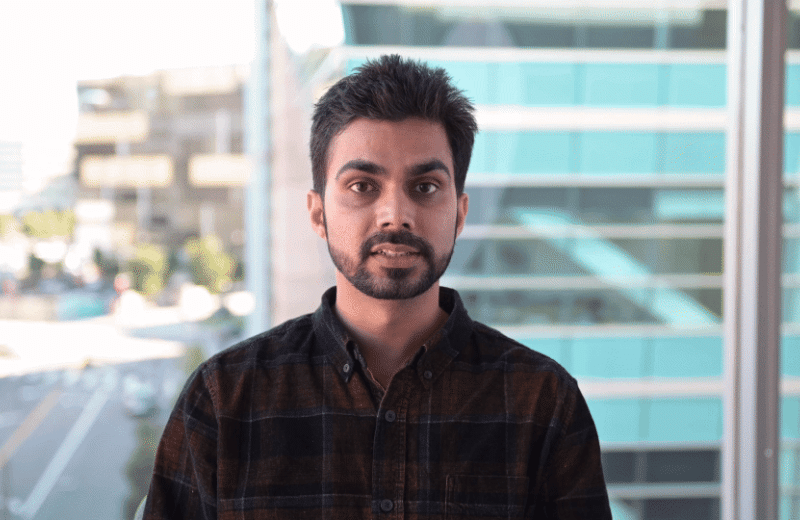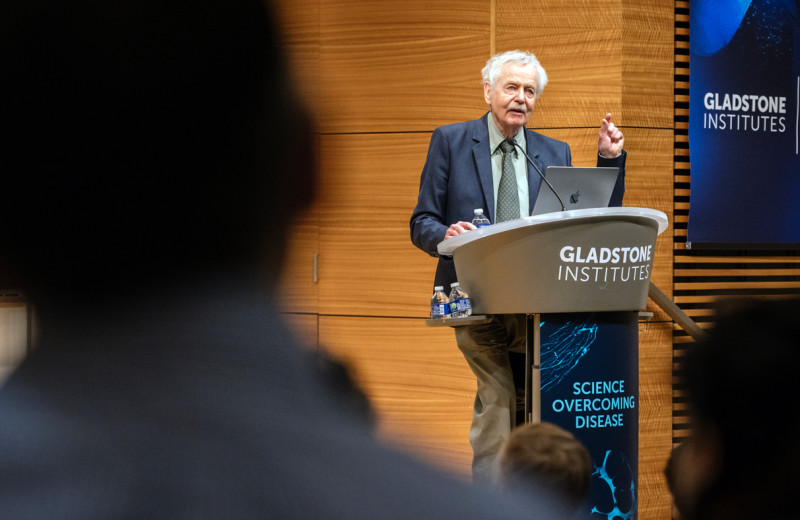Gladstone NOW: The Campaign Join Us on the Journey✕

Julia is the director of Grants and Contracts at Gladstone. She grew up in the Bay Area and spent most vacations camping and fishing in the Sierras with her family. She attended California State University, Monterey Bay, and received her BA in social and behavior science, minoring in psychology.
What brought you to Gladstone?
I heard about Gladstone while attending a conference by the Society of Research Administrators International in Denver, Colorado. A group of people from the conference got together to go see a Colorado Rockies game. On the way there, my boss at the time introduced me to Dan Oshiro, former vice president for administrative affairs at Gladstone. Dan spoke so highly of Gladstone, that by the end of the game, I wanted to work here. It was awhile before I found any openings in the Grants Department, but I eventually found an opportunity to apply.
What do you like about Gladstone?
I really like the people here. It’s telling when new team members start and they comment on how nice and helpful everyone is. It just reminds me to be grateful for everyone I work with. I’ve always felt supported, not just by my own team members, but also by other departments. Right now feels like a particularly special time in Gladstone’s history.
Can you describe your role and the role of the Grants and Contracts team at Gladstone?
I’ve been told “grants and contracts” can seem mysterious and people don’t really understand what we do. On a personal note, only one person in my life outside of work knew what I did as soon as I told them—and that was my uncle, who was a scientist. When talking to other grant administrators, you find out that most of their families think they are grant writers. My family just tells people I’m in human resources because that’s easier to explain.
So, what do we do? The Grants team helps scientists obtain (pre-award) and manage (post-award) their grants and contracts. Most pre-award administration involves reading and interpreting the submission instructions. We then communicate those to the scientists. Once we receive the proposal documents, my team makes sure everything is compliant and, often, heroically submits applications 2 minutes before the deadline! Post-award administration is a mix of responsibilities that range from keeping investigators apprised of their progress report due dates, compiling and submitting progress reports, reporting on financials to the sponsor, and keeping the investigators up-to-date on their spending for each project.
In a nutshell, we do whatever is needed to make sure the scientists can continue to do their science and the sponsor has what they need to continue funding the research.
What do you like most about your job?
I enjoy the problem-solving aspect of my job. Research administration is incredibly dynamic and not always as simple as reading the instructions and following them. Most grants can be pretty straightforward, but usually one or two in your portfolio come with certain challenges. Working through those and coming out on the other side successfully is pretty awesome.
Can you describe one of the people who influenced your career?
My former boss at the Parkinson’s Institute really allowed me to have the space I needed to learn the job. He wore many hats since he was the CFO of a small institute, but he was always there to let me talk through things and bounce ideas off him. Working for him and for the scientists there really solidified my desire to continue down this career path.
What do you do when you are not working?
I have a large blended family and I spend most of my time with them when I’m away from work. We are often watching hockey or playing board games. Most recently, my 5-year-old son and 2-year-old daughter have become obsessed with UNO. This game is a beloved pastime for my older step-children who have had a blast teaching their little siblings.
If you could learn to do anything, what would it be?
I would like to learn how to paint with different types of media. One of my step-daughters is quite the artist and she understands the ins and outs of all the different media. It’s all a little intimidating to me, but I think it would be something fun to learn if I had time.
What is your hidden/unique talent?
I would probably have to say knitting. I usually knit stuffies and some of my favorite projects have been stuffed monsters. I owe this talent to my colleague Teresa Roberts, who taught me everything I know. When I have time, I like to meet up with the Gladstone knitting club.
Name one thing that not many people know about you.
I don’t think many people know that I play cribbage. My husband introduced me to the game when we first started dating and now it’s our go-to card game. We take a board and a deck of cards with us anywhere we go.
If you could meet any scientist from any point in time, who would it be and why?
I would like to meet Edward Jenner, the inventor of the small pox vaccine, just to thank him. Vaccines have saved so many lives and, as a parent, you already have so much to worry about. Knowing there is a whole group of viruses that I don’t have to worry about my children contracting is pretty amazing.
Want to Join the Team?
Our people are our most important asset. We offer a wide array of career opportunities both in our administrative offices and in our labs.
Explore CareersMeet Gladstone: Shyam Jinagal
Meet Gladstone: Shyam Jinagal
Shyam Jinagal explores how genetics, aging, and regeneration shape the heart—and how those insights could one day restore heart function after injury.
Graduate Students and Postdocs Profile Cardiovascular Disease Srivastava LabA Sculptor of Modern Regenerative Medicine
A Sculptor of Modern Regenerative Medicine
Among his myriad accomplishments, Rudolf Jaenisch—winner of the 2025 Ogawa-Yamanaka Stem Cell Prize—was the first to demonstrate the potential of induced pluripotent stem cells to treat disease.
Awards Ogawa Stem Cell Prize Profile Regenerative Medicine Stem Cells/iPSCsMeet Gladstone: Shijie Wang
Meet Gladstone: Shijie Wang
Shijie Wang, a postdoctoral scholar in Steve Finkbeiner’s lab, uses artificial intelligence, robotics, and stem cell technologies to uncover how brain cells die in neurodegenerative diseases like Alzheimer’s and Parkinson’s.
Profile Neurological Disease Finkbeiner Lab AI Robotic Microscopy



